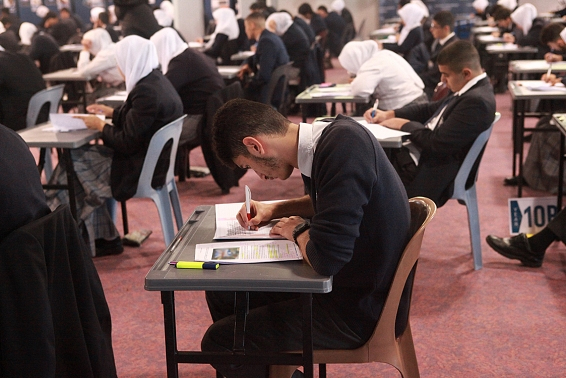We offer students the opportunity to study for the Victorian Certificate of Education (VCE) instead of the IB Diploma programme. The highly regarded VCE offers students a wide variety of Year 11-12 studies catering to all areas of interest. Students benefit from extensive career counselling to assist them towards the achievement of their study and career goals while emphasising the importance of personal responsibility for success.

The Victorian Certificate of Education (VCE) is a single certificate requiring students to satisfactorily complete at least 16 units of study. The VCE is a two year course that is normally undertaken in years 11 and 12 of secondary school.
The VCE subjects are known as Studies. They can be selected from two broad areas, these being:
- Arts/Humanities, and
- Maths/Science/Technology
Each VCE Study consists of 4 units which are completed over 2 years with each unit representing one semester’s work. Each unit consists of at least 50 hours of class time.
- Units 1 and 2 are studied in year 11
- Units 3 and 4 are studied in year 12 as a sequence (both units must be completed in the same year)
Entry into the VCE
There are no specific requirements for entry into Units 1 and 2 which are generally studied at a year 11 level. Unit 3 may be undertaken without having completed Units 1 and 2; however, in some studies it is advisable to have completed Units 1 and 2 before attempting Unit 3. Unit 3 must be completed before undertaking Unit 4.
Completing the VCE
To be awarded the VCE, students must satisfactorily complete at least 16 units. The 16 units must include:
- at least three units of English
- at least three sequences of Units 3 and 4 studies other than English

Outcomes and SACs
Outcomes
- Each VCE unit includes a set of two to four specific outcomes set by the Victorian Curriculum and Assessment Authority (VCAA).
- Each outcome is described in terms of key knowledge and skills students are required to demonstrate.
- To satisfactorily complete a unit, a student has to demonstrate that they have achieved the set outcomes that are specific for the unit. In other words, students must demonstrate that they have an understanding of the knowledge and the skills that have been taught within a specific unit.
- If a student fails to achieve the set outcomes for the unit, the student cannot be considered to have satisfied the requirements of the unit; therefore, the student receives `N’ (not completed satisfactorily) for the unit and this unit will not be counted towards the VCE.
- Only units for which an `S’ (completed satisfactorily) has been awarded can count towards the 16 units required for the award of the certificate.
School-Assessed Coursework (SACs)
- School-Assessed Coursework (SAC’s) are appropriate learning activities which enable students to develop the knowledge and skills described in the set of outcomes for each unit.
- The activities are tasks that a student would be expected to be doing in relation to what they are studying. These activities may include: practical work, written reports, essays, oral presentations, poster and multimedia presentations, assignments, folio of exercises, modelling activities, use of computer software and/or applications, tests, etc.
- School-Assessed Coursework tasks will be mainly undertaken during class time and within a limited time. This is necessary to enable teachers to authenticate the work undertaken by students.

Assessment and Scoring
Assessment of Units 1 and 2
- Assessment is based on the satisfactory completion of School-Assessed Coursework (or SACs) which demonstrates that students have achieved the specific outcomes for the unit.
- Students must satisfactorily complete the tasks set by the teacher to satisfactorily complete the specified outcome.
Assessment of Units 3 and 4
- Assessment is based on school assessment (School-Assessed Coursework) and an external examination(s) in all studies.
- All subjects (except Studio Arts and Visual Communication & Design) will have an external examination component of at least 50%.
- Assessment tasks for the School-Assessed Coursework and the weighting of marks for each task is prescribed by the Victorian Curriculum and Assessment Authority (VCAA).
- The student’s level of performance is graded on a scale of A+ to E, where E is the lowest acceptable level of achievement.
- A piece of work which fails to meet the minimum acceptable level will be reported as UG (ungraded).
- If an assessment task is not completed or submitted, NA (not assessed) will appear on the report.
- The combination of School-Assessed Coursework scores and external examination scores will determine the students study score (out of 50) for a specific subject.
Statistical Moderation of School-Assessed Coursework
- School assessment is an important part of Units 3 and 4, and contributes between 33% and 50% of the study score depending on the specific unit.
- Since teachers have the flexibility in selecting the assessment tasks for the completion of the School-Assessed Coursework, there may be variations between schools in terms of the level of difficulty of the tasks and the marking of the tasks.
- To ensure that all School-Assessed Coursework assessments made by all VCE schools are comparable and fair to all students, the VCAA carries out statistical moderation of the coursework scores against the external examination scores.
- Statistical moderation adjusts the level and spread of the students’ school assessment in a particular study, to match the level and spread of the same students’ scores on a common external score. Since the external score is based on examinations done by all students, it is a common standard against which schools’ assessments can be compared.
Study Scores
- Study scores are reported on a scale of 0 to 50, with an average score of 30.
- A study score is an indicator of the student’s overall performance in relation to others who took the same study in the same year.
- A student with a study score of 30 is in the middle of the cohort, or has performed better than about half of all students.
- A student with a study score above 37 indicates that the student is in the top 15% in the study.
Subjects We Offer
We constantly endeavour to provide students with the widest range of subjects possible. Below is a list of the VCE subjects offered at the AIA.
Languages | English / English (ESL) Arabic French Indonesian Turkish |
Arts | Arts - Making and Exhibiting |
Maths and Science | Biology Chemistry Maths: General Mathematics 1 & 2 Maths: Further Maths 3 & 4 Maths: Maths Methods Physics |
Humanities | Accounting Business Management History Global Politics Legal Studies Psychology Religion and Society Text and Traditions |
Health and Physical Education | Health and Human Development |
Technology | IT Computing |
NB: VCE subjects will only run if there are sufficient numbers.
Who is VCE for?
The VCE is for students who want a senior school educational programme that:
- Provides breadth and flexibility
- Caters to students' needs and interests
- Engages students in a wide ranging variety of assessment tasks and examinations
Successful VCE students should:
- Be motivated and self directed in their study
- Be able to cope with pressure
- Have good organisational and time management skills
- Have independent study habits
- Have enthusiasm for learning and accepting of challenges
You may access the VCE Handbook via Compass.
 |
Click here to access via Compass. |

